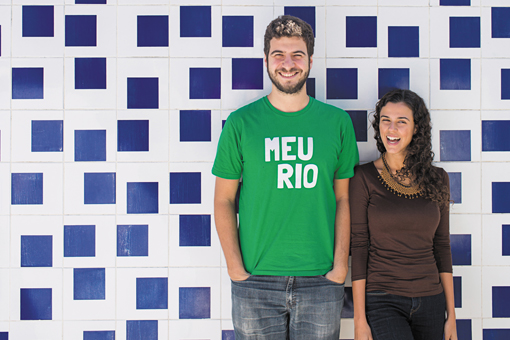Alessandra Orofino’s globetrotting career as a student and human rights advocate has always flirted with political activism. The 25-year-old Rio de Janeiro native has lived in Montreal, Paris, New Delhi, and New York. But when she returned to Rio in 2008 to work as a field researcher on gender-based violence, she realized that the most exciting prospects for political change were in her home city—anticipating by several years the citizen-led protests that would later sweep Brazil.
Today, Orofino and her friend Miguel Lago, 26, are at the forefront of a growing effort to increase local civic engagement in politics. Their organization, Meu Rio (My Rio), which they co-founded in 2011, has enabled thousands of ordinary citizens to become community activists (or agitadores) for causes that they care about—from the decriminalization of baile funk dance parties in Rio’s favelas to tracking city buses by GPS to improve transportation services.
Meu Rio’s model is influenced in part by Orofino’s experience working for the New York City-based nonprofit Purpose—whose mission is to use technology to improve economic and social inclusion. Members of Meu Rio create personal online profiles to network, start grassroots campaigns and recruit volunteers to support them. Meanwhile, Meu Rio’s staff of 15 steps in to provide publicity and manpower—coordinating local volunteers and reaching out to the press and public policy specialists.
Unlike most NGOs in Brazil, Meu Rio gets no government or political party funding—and the resulting independence has added legitimacy to its political campaigns, which have ranged from improving public access to city services to promoting gender equality and animal rights. The organization relies almost entirely on donations from private individuals, who give anywhere from $4 to $150 monthly through Meu Rio’s online Faça Acontecer (Make It Happen) funding campaign.
Like its youthful founders, most of the 140,000 registered members of Meu Rio are between 18 and 29 years old. “We need more young people who are interested in politics and really want to shape the way our democracies evolve,” Orofino says. “Otherwise, in 10, 20 years from now, we’re going to look back at the city and say well, it changed, but not really in the way that we wanted it to change.”
Orofino cites Meu Rio’s campaign to create a centralized system for recording, tracking and investigating cases of missing people in Rio de Janeiro as one of her proudest achievements. The campaign was sparked by a mother and agitadora, Jovita Belfort, whose 20-year-old daughter disappeared over a decade ago. In spite of its high homicide rate (24 homicides per 100,000 people in 2012), Rio lacked a streamlined system for identifying missing persons, and Belfort was forced to check the city’s shelters and morgues weekly for the past 10 years. She still has not found her daughter.
“Her biggest fear was, ‘My daughter is going to be found and I won’t know,’” recalls Orofino. After six months of campaigning through Meu Rio with online and offline events, calls with the chief of police, fundraising, and city-to-city meetings where Rio officials could learn from successful programs in other cities—such as Belo Horizonte—Rio’s police officers presented a plan and budget to implement a missing persons system that was approved in April.
The Meu Rio initiative recently received two institutional grants—a grant from the Omidyar Network, an investment firm established by eBay founder Pierre Omidyar, and a $1 million reais ($437,800) Google Impact Award—to expand its model to 20 more Brazilian cities. The new initiative is called Minhas Cidades (My Cities). In São Paulo, where the organization has just set down new roots, there are already over 10,000 registered members.
Meu Rio’s model is attracting interest from other Brazilian cities, and Orofino hopes the concept of online grassroots campaigns will spread even further. “I think that the challenge of our time, as people who live under democratic regimes, is [to ensure] that democracies remain a vibrant and viable model,” she says. “If we don’t build upon what we have, we lose it.”





